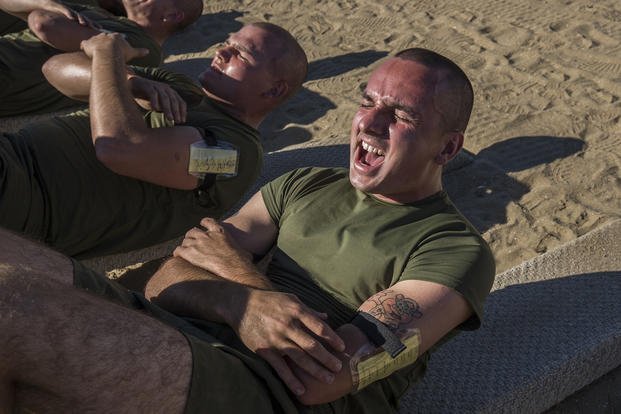When should you start the enlistment process with a recruiter? The right answer depends on your military goals. Many make a serious mistake by either starting the process too soon or not soon enough.
Here is a question from a strong candidate who currently does not meet the physical standards of the military.
Hey Mr. Smith, I am a strength athlete. Should I wait until I lose weight and get into military shape before talking with a recruiter or go sit down with a recruiter while in the process of losing weight?
Thanks for considering military service. There are two answers to this question, because the answer depends on your branch of service as well as the job you are seeking in the military.
As someone who needs to lose weight while getting into military shape, take the needed time on your own to prepare yourself for the upcoming physical challenges. If you do this, the recruiting office will take you more seriously, and you will better handle the running, rucking and PT tests, as well as meet the other standards like height/weight and body-fat percentage.
Every year, hundreds of people will walk into a recruiter's office and want to join some form of special ops program. These recruits start the recruiting process and have not yet considered preparing for a pre-boot camp fitness test that is required of them.
If you do not pass this initial fitness test, you will not be granted the special ops program after basic training. These recruits must now spend the remaining days in the delayed entry program solely focused on the fitness test to get into the training pipeline and are unable to spend enough time on the much more difficult challenges of getting through the training pipeline.
This kind of recruit is responsible for most of the high attrition rates in training programs such as Navy SEAL, EOD, Diver, SWCC, Air Force Special Warfare, Army Ranger and Special Forces, and Marine RECON.
The problem is more a lack of specific preparation. If you know you have a fitness test to prepare for and your performance will determine the outcome of your job selection, you need time to build yourself to that level of physical ability. The enlistment process may not be long enough.
You also must consider the physical preparation specific to the future special ops selection. If you neglect these steps, chances are that you will be a statistic and not be able to do your initial military job.
If you must lose weight, that process may even be longer, especially if some of the weight you must lose is excess muscle mass and bulk. Often your athletic performance on qualifying fitness tests will depend on your ability to handle your body weight through high-repetition calisthenics and timed run events. Heavier athletes tend to have issues with scoring well on these events. Your delayed entry time may not be long enough to prepare fully.
However, if you are joining the conventional military and only have 10-20 pounds to lose, it is very possible to start training during the recruitment process as it takes a few months to get the medical review, background checks and other qualifications squared away before the recruiters can serve you a shipping-out date.
This may be plenty of time to prepare for the physical qualifications as well as the height, weight and body-fat standards. Also, if you are bordering on the maximum age limit and time is a factor if you want to join without an age waiver, then you may want to get the enlistment process started sooner rather than later.
Instead of setting yourself an arbitrary timeline to join and serve, consider a physical performance starting line where you assess your abilities long before you join the military so there are no weaknesses left undeveloped.
I promise you that any weakness will be exposed in the first week of any military or special ops training. Doing this little bit of preparation and demonstrating some patience will increase your chances of finishing what you wanted to do when you first considered walking into a military recruitment office.
-- Stew Smith is a former Navy SEAL and fitness author certified as a Strength and Conditioning Specialist (CSCS) with the National Strength and Conditioning Association. Visit his Fitness eBook store if you're looking to start a workout program to create a healthy lifestyle. Send your fitness questions to stew@stewsmith.com.
Want to Learn More About Military Life?
Whether you're thinking of joining the military, looking for fitness and basic training tips, or keeping up with military life and benefits, Military.com has you covered. Subscribe to Military.com to have military news, updates and resources delivered directly to your inbox.


















